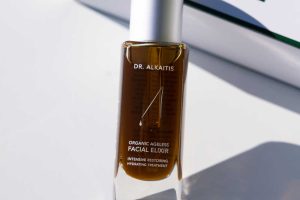
Dr Alkaitis Organic Ageless Facial Elixir
The Ageless Elixir is one of Dr. Alkaitis’ most profoundly complex, nourishing products, essential for mature and aging skin.
Mineral SPF: Clean & safer sun protection for you and the environment
SPF is no longer just for summer. Necessary to protect our skin from damaging and ageing UVA and UVB radiation, this everyday beauty essential is now a part of our daily skincare regimen. But with household names in the personal care industry losing a class action claim in the USA over carcinogenic contaminants in everyday personal care products and ongoing claims of ingredient contamination leading to repeated product recalls, trusting that your SPF not only protects you from the sun but is actually safe to use on your skin is harder than ever.
The spotlight on the safety of chemical sunscreens isn’t a new debate. We know that as a living organ the skin absorbs a proportion of any chemical (both good and bad) that are applied to it, and that some of these can then enter the bloodstream. There have also been several clinical findings that have resulted in an ever-growing list of chemicals banned from use in sunscreens and scientific findings continue to prompt regulatory review of permissible ingredients. However, more and more research is still finding that the active chemicals in our trusted sunscreens are either toxic themselves or contaminated with other toxic substances that are known to be either genotoxic, carcinogenic, endocrine disruptors or all of the above!
What is not debated is that sunscreen is an essential personal care product, there is no doubt that when it comes to sun exposure it remains one of the best ways to protect your skin from premature ageing, prevent skin cancer and save lives. But the lack of transparency around the safety of certain ingredients contained in sunscreens is casting a shadow of doubt and distrust over the entire industry. Finding an SPF that is not just effective sun protection but is also SAFE isn’t as simple as it should be.
At The NATIVES Co. our clean beauty ethos is not based on fearmongering or undermining the significant benefits to society afforded by the investment, development and progress in the personal care industry over the last century. I for one am grateful that we live in an era of generally good personal hygiene and dental health, largely attributed to the products and education from the personal care industry and often driven by the large corporations. However, this does not render them unaccountable for how they formulate or for what goes into our personal care products.
What modern science can tell us about ingredients and products should and must dictate change, and we believe that change should come readily, without resistance or the temptation to choose profit over safety.
So, what do we think you should know about the ingredients in your sunscreen and how can you choose a sunscreen that is safe for you? Read on….
When it comes to sunscreen, we should be aware that there are two types of protection, chemical and physical screens. Chemical SPF is made from petrochemical sunscreen that is absorbed into the top layers of the skin where they convert UV rays into heat, preventing it from penetrating further into the body. Chemical sunscreens include active ingredients such as oxybenzone, avobenzone, octisalate, octocrylene, homosalate, or octinoxate. A formulation often combines several of these chemicals working together to provide extended protection. The appeal of chemical sunscreens is that they are typically invisible to the eye, and since they soak into skin, they leave behind no greasy feel or unwanted tint.
The concern with chemical sunscreens lies in what we don’t know about them. While there is some evidence to suggest that petrochemical sunscreens e.g. oxybenzone, homosalate, octocrylene, are linked to a number of toxicities and diseases, we in fact know so little about their safety that in 2019 the FDA in the US determined there was “insufficient safety data” to determine if they were safe or unsafe. A position they reaffirmed in September 2021. The TGA in Australia also adopts the same position, and so these chemicals remain in limbo, not classified as generally recognised as safe and effective (GRASE) but nor have they been determined as unsafe, and so are still used in the products you can purchase today.
There is mounting scientific evidence to show that our personal care products including sunscreen contain trace amounts of contamination by various toxic chemicals. In May 2021 Valisure -an independent testing and consumer advocacy organisation, released findings from their testing that found unacceptably high levels (up to 3 times the permissible trace limit) of benzene in 78 well-known sunscreens. Benzene is a known human carcinogen, even at very low levels it is closely linked to leukemia and other blood cancers.
Although banned for use in personal care products, benzene is a chemical solvent that is used widely in the production of other chemicals, including chemical sunscreens such as octocrylene. The contamination occurs during the manufacturing process which fails to completely remove the benzene solvent from the final synthetic material. The result is end products contaminated with toxic chemicals that are never disclosed or form part of the ingredient list.
Beyond the significant concern for public health, there is also evidence that both chemical sunscreens and benzene pose a serious risk to the environment, marine ecosystems, and waterways.
We know that SPF readily enters our marine ecosystems when it washes off our skin either through swimming in the ocean or in the shower at home. It also enters our waterways from runoff of discarded product containers in landfill. The chemical components in chemical SPF and benzene do not readily break down in the environment, rather they bioaccumulate, and so the potential for these sunscreen products to threaten coral reefs and other marine life is compounding and reaching critical impact.
Unfortunately, benzene contamination is a broad and very concerning issue inherent in the consumer product supply chain. In a perfect world the supply chain would be regulated, and contamination identified and rectified at the source of the raw synthetic ingredients. However, the current regulatory gaps regarding benzene in both drug and cosmetic products are complex and slow to resolve. Instead, we rely on manufacturers to quickly investigate and remove contaminated products from the market.
So what if the question wasn’t about how to regulate these companies and manufacturers but rather why they continue to use questionable or contaminated ingredients in their products in the first place? What safer SPF alternatives are there?
The FDA and Australian TGA categorises zinc oxide and titanium dioxide as “Generally Recognised as Safe and Effective” (GRASE). These naturally occurring minerals create a physical barrier, reflecting both UVA and UVB rays, preventing them from entering the skin and providing broad-spectrum protection.
Natural sunscreens containing mineral based SPF have been used and tested for over 40 years, proving to be both safe and effective; their only downside is the old formulations that can be thick and pasty, leaving a noticeable white cast on the skin. Thankfully modern cosmetic chemistry is changing that, and new formulations not only wear well but also combine natural sunscreen with beneficial skin loving ingredients for an all-in-one everyday product that provides protection and nourishment.
At The NATIVES Co. we only endorse sunscreen brands with a Clean and Green ethos that aligns with ours. That means opting only for natural sunscreen with mineral based SPF that leaves out questionable chemical filters. Safer for you, safe for the planet.
Brands such as the award-winning Australian owned and made People4Ocean offer natural sunscreens that are free from parabens, oxybenzone and other chemical sunscreen filters that leave a toxic residue on your skin and in our oceans. People4Ocean live and breathe their environmental responsibility. Committed to preserving and protecting our precious marine environment, for every product you purchase P4O donates up to $1 to reef conservation initiatives worldwide in an effort to reverse the damage done to our global ocean reefs.
Natural Sunscreen SPF 30
Natural Vegan Sunscreen SPF 50
Vegan Zinc Stick SPF 50+
Little Urchin Sunscreen was also formulated with our reefs and the waterways in mind. The Little Urchin natural sunscreens are not only safer to apply to your skin but also a safer option for our environment, helping to preserve our natural marine life. Free of chemical filters which are often dangerous for our aquatic environment and also sometimes cause severe skin irritations for people with sensitive skin, natural mineral sunscreens create a powerful broad-spectrum physical barrier protection without leaving toxic residue in the ocean after your swim or on your body.
Zinc formulations have also had a transformation of late. Little Urchin Natural Clear Zinc Sunscreen SPF 50+ is a smooth, non-greasy and clear formula that the entire family can wear. It provides four hours water resistant protection and is safe for babies six months and over. It applies easily and wears well under makeup too! Free from synthetic ingredients and fragrances it’s ideal for sensitive skin and is safe for reef and marine life.
When it comes to natural sunscreens, layering is the key to effective sun protection. Little Urchin Natural Tinted Sunscreen SPF 30 provides high UVA and UVB protection as well as giving sheer natural coverage. Perfect for use on its own as a BB cream or layered over your SPF for added coverage on those long days in the sun. You can read more about laying your natural sunscreen in our journal Clean SPF Part II: How to layer your SPF and Makeup.
Natural Clear Zinc Stick SPF 50+
Natural Clear Zinc Sunscreen SPF 50+
Natural Tinted Sunscreen SPF 30

The Ageless Elixir is one of Dr. Alkaitis’ most profoundly complex, nourishing products, essential for mature and aging skin.
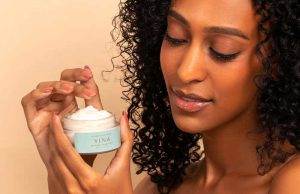
To keep your complexion glowing and hydrated throughout the autumn months, follow our ultimate autumn skincare guide.
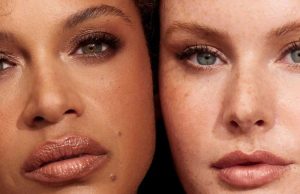
The era of skincare infused makeup is here and it’s a game-changer, enhancing not only the appearance but also the health of your skin.
Tackle the trickier skin concerns with all natural ingredients by focusing on actives in products that improve skin texture and resilience.
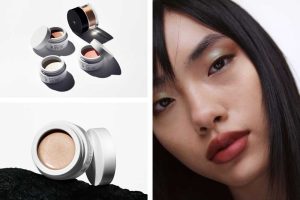
Manasi 7 is on a mission to simplify beauty whilst enhancing it by bridging the gap between conventional makeup products and natural organic ingredients.
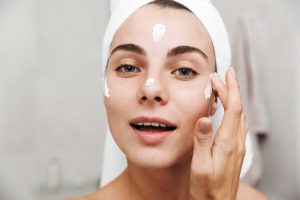
The top 5 ways to preserve and boost collagen production in your skin, naturally at home with a holistic skincare regimen.
No account yet?
Create an Account
Sign Up for VIP offers and exclusive first access to new releases.
